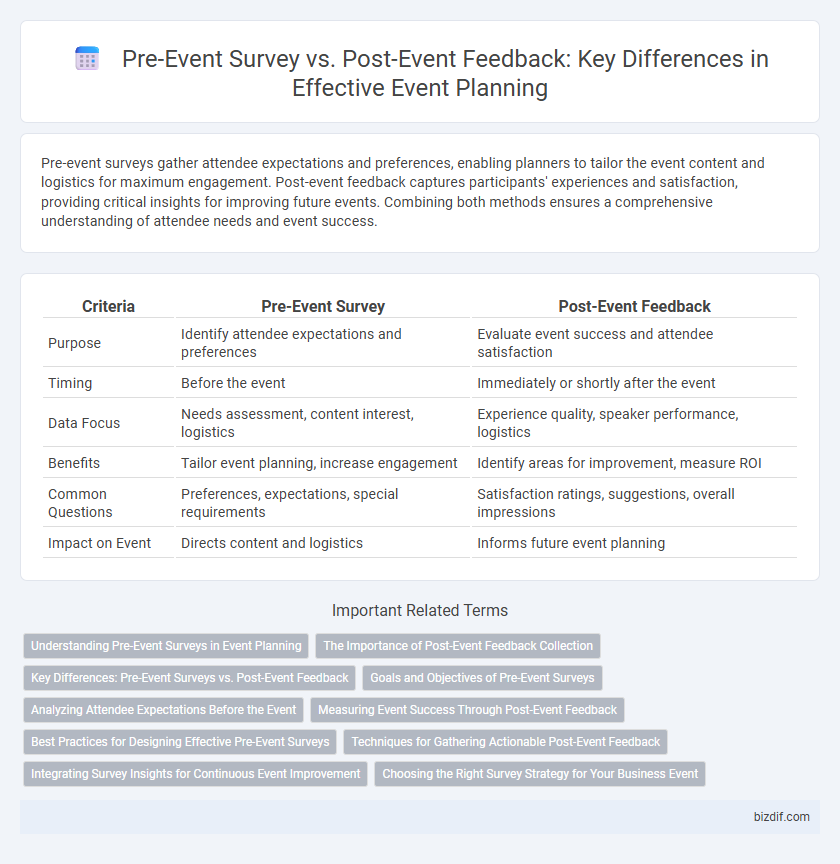Pre-event surveys gather attendee expectations and preferences, enabling planners to tailor the event content and logistics for maximum engagement. Post-event feedback captures participants' experiences and satisfaction, providing critical insights for improving future events. Combining both methods ensures a comprehensive understanding of attendee needs and event success.
Table of Comparison
| Criteria | Pre-Event Survey | Post-Event Feedback |
|---|---|---|
| Purpose | Identify attendee expectations and preferences | Evaluate event success and attendee satisfaction |
| Timing | Before the event | Immediately or shortly after the event |
| Data Focus | Needs assessment, content interest, logistics | Experience quality, speaker performance, logistics |
| Benefits | Tailor event planning, increase engagement | Identify areas for improvement, measure ROI |
| Common Questions | Preferences, expectations, special requirements | Satisfaction ratings, suggestions, overall impressions |
| Impact on Event | Directs content and logistics | Informs future event planning |
Understanding Pre-Event Surveys in Event Planning
Pre-event surveys in event planning are essential tools for gathering attendee preferences, expectations, and demographic insights before the event takes place. These surveys enable planners to tailor content, logistics, and experiences to meet audience needs effectively, increasing engagement and satisfaction. Collecting data pre-event also helps identify potential issues early and align event objectives with participant interests for optimized outcomes.
The Importance of Post-Event Feedback Collection
Post-event feedback collection provides critical insights into attendee satisfaction, allowing organizers to measure the success of an event against predefined objectives. This data helps identify strengths and areas for improvement, enhancing future event planning and execution. Gathering detailed feedback on speaker performance, venue suitability, and overall experience supports continuous improvement and maximizes return on investment for stakeholders.
Key Differences: Pre-Event Surveys vs. Post-Event Feedback
Pre-event surveys gather attendee expectations, preferences, and needs to tailor event planning and enhance relevance, while post-event feedback evaluates overall satisfaction, effectiveness, and areas for improvement. The primary distinction lies in timing and purpose: pre-event surveys inform event design and logistics, whereas post-event feedback measures success and attendee experience. Analyzing both data sets ensures continuous optimization of event strategies and maximizes participant engagement.
Goals and Objectives of Pre-Event Surveys
Pre-event surveys aim to identify attendee expectations, preferences, and potential barriers to participation, enabling event planners to tailor content and logistics accordingly. These surveys collect crucial data such as preferred session topics, dietary restrictions, and accessibility needs to enhance attendee satisfaction. By setting clear objectives for pre-event surveys, organizers can optimize resource allocation and increase overall event engagement.
Analyzing Attendee Expectations Before the Event
Pre-event surveys capture attendee expectations and preferences, allowing event planners to tailor content and logistics for a personalized experience. Collecting data on participants' goals, interests, and anticipated challenges helps optimize session topics and networking opportunities. Analyzing this feedback before the event ensures targeted engagement strategies that enhance overall satisfaction and event success.
Measuring Event Success Through Post-Event Feedback
Measuring event success through post-event feedback provides direct insights into attendee satisfaction, engagement levels, and areas for improvement, enabling event planners to make data-driven decisions for future events. Post-event surveys capture detailed impressions and experiences that pre-event surveys cannot predict, offering a comprehensive evaluation of event outcomes. Leveraging tools like Net Promoter Score (NPS) and qualitative comments enhances the accuracy and depth of feedback analysis.
Best Practices for Designing Effective Pre-Event Surveys
Designing effective pre-event surveys requires clear, concise questions that focus on attendee expectations, preferences, and potential barriers to participation. Utilizing multiple-choice and rating scale formats enhances response accuracy and eases data analysis, while open-ended questions provide qualitative insights for personalized event experiences. Implementing mobile-friendly survey platforms and sending reminders improves response rates and ensures actionable data to tailor event logistics and content effectively.
Techniques for Gathering Actionable Post-Event Feedback
Effective techniques for gathering actionable post-event feedback include deploying targeted online surveys that focus on specific event aspects such as content quality, speaker performance, and venue experience. Leveraging real-time feedback tools like mobile apps or SMS prompts immediately after sessions increases response rates and captures authentic attendee sentiments. Analyzing open-ended responses alongside quantitative ratings provides deeper insights into attendee satisfaction and areas for improvement in future event planning.
Integrating Survey Insights for Continuous Event Improvement
Pre-event surveys gather attendees' expectations and preferences, enabling tailored event planning that aligns with participant needs. Post-event feedback provides critical insights into attendee satisfaction and areas of improvement, highlighting what aspects succeeded or require refinement. Integrating both data sets allows event planners to create a continuous improvement loop, optimizing future events based on comprehensive, attendee-driven insights.
Choosing the Right Survey Strategy for Your Business Event
Pre-event surveys gather insights on attendee expectations, preferences, and needs, enabling tailored event content and logistics to increase engagement and satisfaction. Post-event feedback assesses overall experience, identifies strengths and areas for improvement, and measures event success against objectives. Selecting the right survey strategy depends on event goals, timing, and desired actionable data to optimize future planning and enhance attendee experience.
Pre-event survey vs post-event feedback Infographic

 bizdif.com
bizdif.com